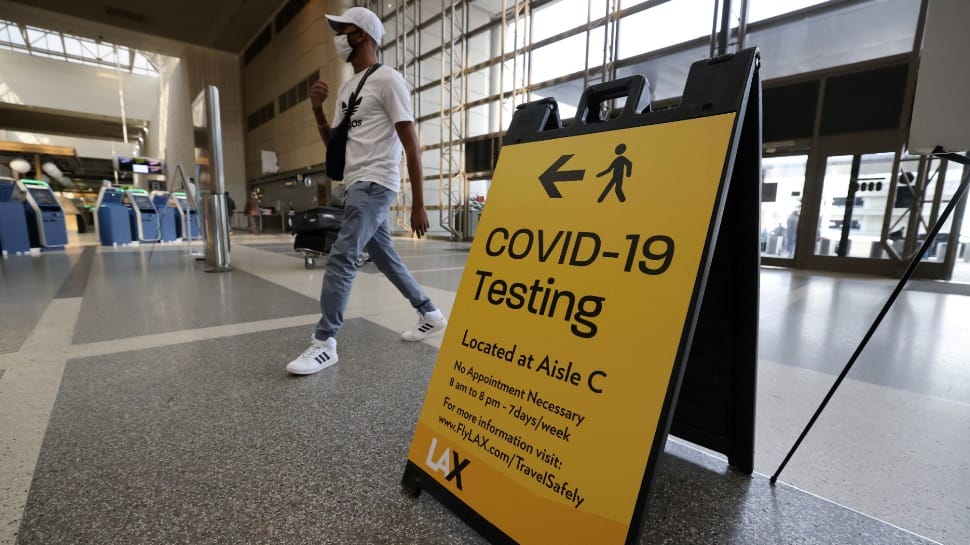COVID-19: All you need to know about new virus variant
The PHE said that they know that mutations in the spike protein, the part of the virus that makes it infectious, can change how the virus interacts with human cells.
- According to Public Health England, the new strain transmits more easily than the previous variant.
- They said that there is no evidence that it is more likely to cause severe disease or mortality.
- As per them, the way to control this virus is the same and it will not spread if people avoid close contact with others.
Trending Photos
) File Photo (Reuters)
File Photo (Reuters) New Delhi: Amid the ongoing COVID-19 crisis, a new variant of the virus has been detected in the United Kingdom (UK), that has resulted in several countries closing their borders and suspending their flights, besides other restrictions.
According to Public Health England (PHE), the new strain transmits more easily than the previous variant but there is no evidence that it is more likely to cause severe disease or mortality.
They said that the data from Whole Genome Sequencing, epidemiology and modelling suggest the new variant 'VUI – 202012/01' (the first variant under investigation in December 2020) transmits more easily than other strains.
"We currently have no evidence that the variant is more likely to cause severe disease or mortality – but we are continuing investigations to understand this better," the PHE said.

As per them, the way to control this virus is the same and it will not spread if people avoid close contact with others.
"Wash your hands, wear a mask, keep your distance from others, and reduce your social contacts," PHE added.
The PHE said that they know that mutations in the spike protein, the part of the virus that makes it infectious, can change how the virus interacts with human cells. However, they do not yet know the mechanism for this increase in transmission.
"The evidence shows that infection rates in geographical areas where this particular strain has been circulating have increased faster than expected, and the modelling evidence has demonstrated that this variant has a higher transmission rate than other variants in current circulation," they said.
They stated that the backwards tracing using the genetic evidence suggests this variant emerged in September 2020 and then circulated at very low levels in the population until mid-November.
The increase in cases linked to the new variant first came to light in late November when PHE was investigating why infection rates in Kent were not falling despite national restrictions.
"We then discovered a cluster linked to this variant spreading rapidly into London and Essex. Evidence of increased transmissibility was provided to NERVTAG and ministers on December 18," the PHE noted.
Over 1,100 cases with this variant were identified by the end of December's second week, predominantly in the South and East of England.
As of December 21, the vast majority of cases identified are in London, the South East and the East of England.

They also said that there is currently no evidence to suggest that the Pfizer COVID-19 vaccine would not protect people against the new strain and said that further laboratory work is currently being undertaken as a priority to understand this.
Meanwhile, few countries across the world have also reported the new virus variant. Australia's federal health minister Greg Hunt said on Monday that the new strain has been detected in a small number of cases, The Guardian reported.
The health ministry in Italy has also said that it detected a patient with the new COVID-19 strain.
Countries including India, France, Russia, Bulgaria, Germany, Italy, Belgium, the Irish Republic, Saudi Arabia, Turkey, Switzerland, Kuwait, Oman and Canada have already postponed their flights to the UK.

On the other hand, oil prices and stock markets also plummeted on Monday due to the effect of the new coronavirus strain.
Brent crude was down $2.23, or 4.3%, to $50.03 a barrel by 1308 GMT while the US West Texas Intermediate (WTI) crude was down $2.10, or 4.3%, to $47.00 a barrel.
Both contracts had fallen more than $3 earlier in the session, their biggest daily drop in 6 months.
"Reports of a new strain of the coronavirus has weighed on risk sentiment and oil. New mobility restrictions across Europe are also not helping as European oil demand will suffer," said UBS oil analyst Giovanni Staunovo.
"Investors need to be mindful that the road to higher oil demand and prices will remain bumpy," he added.
Brent had climbed above $50 last week for the first time since March amid optimism stemming from the rollouts of COVID-19 vaccines.

The Investor wealth also eroded by Rs 6.59 lakh crore on Monday as equities tanked after the new strain of the COVID-19 virus. The 30-share BSE Sensex plunged 1,406.73 points or 3 per cent to close at 45,553.96. The benchmark hit an all-time high of 47,055.69 during the session.
Following the sharp selling, the market capitalisation of BSE-listed firms plummeted by Rs 6,59,313.65 crore to Rs 1,78,79,323.05 crore.
"Brutal bloodbath witnessed in today's session after a new coronavirus strain was found in Britain. Market extended losses in late afternoon session, tracking sell-off in the European markets amid concern of fresh travelling lockdown restrictions across countries," said Sumeet Bagadia, Executive Director, Choice Broking.
He added, "Uncertainties over the Brexit deal also dented the investors' sentiments."
Regarding the Brexit which is due to expire on December 31, Sadiq Khan, London mayor, urged the UK government to seek an extension to the Brexit transition period.
Khan said, "With major disruption at Kent now inevitable, I'm urging the Government to officially seek an extension to the Brexit transition period. Securing our key supply chains and fighting the coronavirus pandemic requires the full and undivided efforts of ministers more than ever before."
Stay informed on all the latest news, real-time breaking news updates, and follow all the important headlines in india news and world News on Zee News.
Live Tv







)
)
)
)
)
)
)
)
)
)
